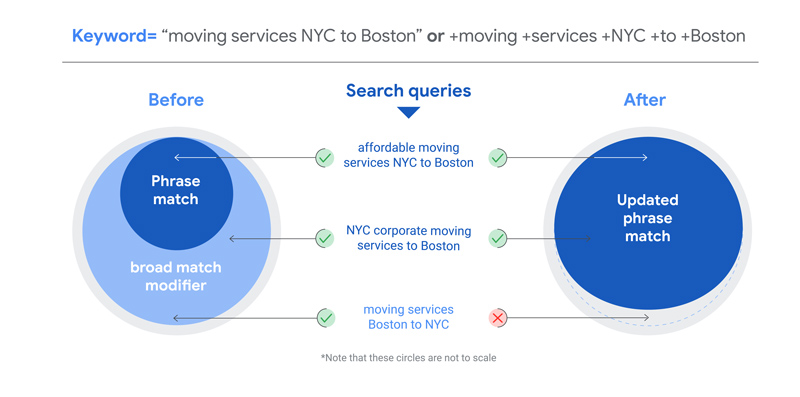Google is constantly making improvements to the way they display and disseminate info on their platform. Their changes are done largely to improve the experience of everyday users. The latest updates place an important focus on the “meaning and intent” of a search more than the absolute words themselves. In combination with Smart Bidding, Google believes these changes will drive performance, making it possible for companies to better reach prospective customers.
Google is updating its phrase matching to cover new queries, essentially making broad match modifiers redundant. This new standard of phrase matching will look at the context and meaning of the search query, and the phrase match keyword will qualify relevant search queries as it sees fit.
The new phrase matching will go live on Feb 18, 2021.
While ads will continue to run for BMM keywords, BMM keywords will simply function as a new phrase match. You won’t be able to add new BMM keywords beginning in July 2021.

This change shouldn’t impact your campaign performance. However, if you use two match types, there will be a shift in traffic from BMM to phrase. If you use only BMM, then BMM will continue to drive the traffic, of course minus irrelevant traffic.
To take full advantage of the new phrase approach:
Over the last year, Google says it has been making more small improvements and updates to keyword and match types to help improve performance of campaigns.
For example, BMM also looks at additional signals, making searches more relevant. They say when paired with Smart Bidding, BMM signals can mean never-before realized opportunities are now within reach.
While keywords that are an exact match to search queries are preferred, they need to fall within certain eligibility criteria.* More control is handed to you with regards to which keywords match searches as well, simplifying keyword selection.
To learn more about the impact of Google’s changes on your campaigns, please read Google’s release.
*Identical queries account for spelling corrections. Reasons a keyword may not be eligible include being budget constrained, being marked “low search volume”, disapproved creatives, or other criteria are not satisfied (such as device or location). From Google release, ”Making it easier to reach the right customers on Search”